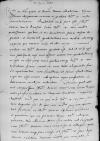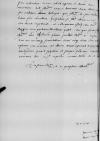Reverendissimo in Christo Patri, domino, domino ⌊Ioanni Dei gratia episcopo Varmiensi⌋, domino meo colendissimo
Reverendissime in Christo Pater et Domine, domine colendissime.
Officiosissimam obsequiorum meorum in gratiam Reverendissimae Dominationis Vestrae commendationem.
Reddidit mihi puer iste illustrissimi domini ⌊ducis Prussiae⌋ ⌊⌋ Reverendissimae Dominationis Vestrae multo gratissimas, quibus et me servitorem suum visere dignatur, et meminit gratitudinis meae verbis utcumque expressae pro munere mihi ab illa misso. Animus quidem, mi Reverendissime Domine, gratus est, sed id mihi ipsi non satisfacit, nisi eam ipsam animi mei gratitudinem re ipsa ac obsequiis meis quibuscumque Reverendissimae Dominationi Vestrae testatam fecero. Cuius rei cum data aliquando fuerit oportunitas, non committam, ut semen istud illius erga me officiorum ab optimo agro profectum, in deteriorem cecidisse videatur.
Ceterum, quod attinet congressum illustrissimi domini ⌊ducis⌋ cum sacra regia maiestate inter proficiscendum in ⌊Magnum Ducatum Lithuaniae⌋, rettuli maiestati suae ea, quae mihi Reverendissima Dominatio Vestra scribere dignata est. De quo iam ⌊maiestas sua⌋ non ignorabat fortasse ex ⌊reverendissimi domini Chelmensis⌋ ⌊⌋ et, quantum ego ex sermone regiae maiestatis colligere poteram, non alienam illam esse video ab eiusmodi cum illustrissimo domino ⌊duce⌋ congressu et colloquio, quod non temere neque sine causa ab illustrissima dominatione sua desiderari arbitror. Verum ⌊maiestas sua⌋ non satis se scire referebat locum ad id aptum et domino ⌊duci⌋ vicinum, sed illustrissimus tamen dominus dux illum pro suo arbitrio deliget, qui illustrissimae dominationi suae videbitur esse commodior, praesertim si illustritati illius ea res ita menti insederit, ut colloquium istud cum maiestate regia non praetermittendum putet. De quo fortasse ⌊reverendissimus dominus Chelmensis⌋ plura ⌊⌋ Reverendissimae Dominationi Vestrae.
Cui me meamque servitutem etiam atque etiam commendo optans ex animo, ut illam Deus Optimus Maximus diutissime servet sospitem et semper felicem.


